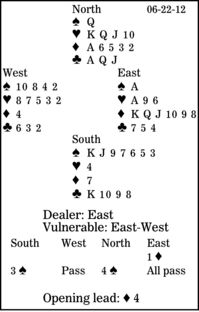Bridge column, June 22: Two losers are fine; three are costly

When playing bridge for money, those who are losing often overbid, trying to recoup their losses. They would do better to go home. Winners, not losers, should be pushing.
In this deal, though, South's problem is how to avoid four losers during the play.
South is in four spades. West leads the diamond four: ace, king, seven. East takes the spade queen with his ace and continues with the diamond queen. What should declarer do?
The three-spade overcall isn't textbook, because the suit quality is not ideal, but it would be the choice of most experts. The 7-4-1-1 distribution has extra trick-taking potential. Note North's raise to four spades. He correctly did not bid three no-trump, when he might have had to win every trick from his own hand.
What was West's lead? Presumably either a singleton or low from a tripleton. In the latter case, there is no danger, but what if West is itching to overruff?
Here, if South ruffs low, West overruffs and shifts to the heart eight. East wins and leads a third diamond, promoting another trump trick for West. The defenders take one heart and three spades.
Instead, South should discard his heart at trick three, cutting the communication between the defenders. He then ruffs the third diamond and is overruffed, but wins the next trick in his hand, draws trumps and claims.
** ** **
COPYRIGHT: 2012, UNITED FEATURE SYNDICATE
DISTRIBUTED BY UNIVERSAL UCLICK FOR UFS

